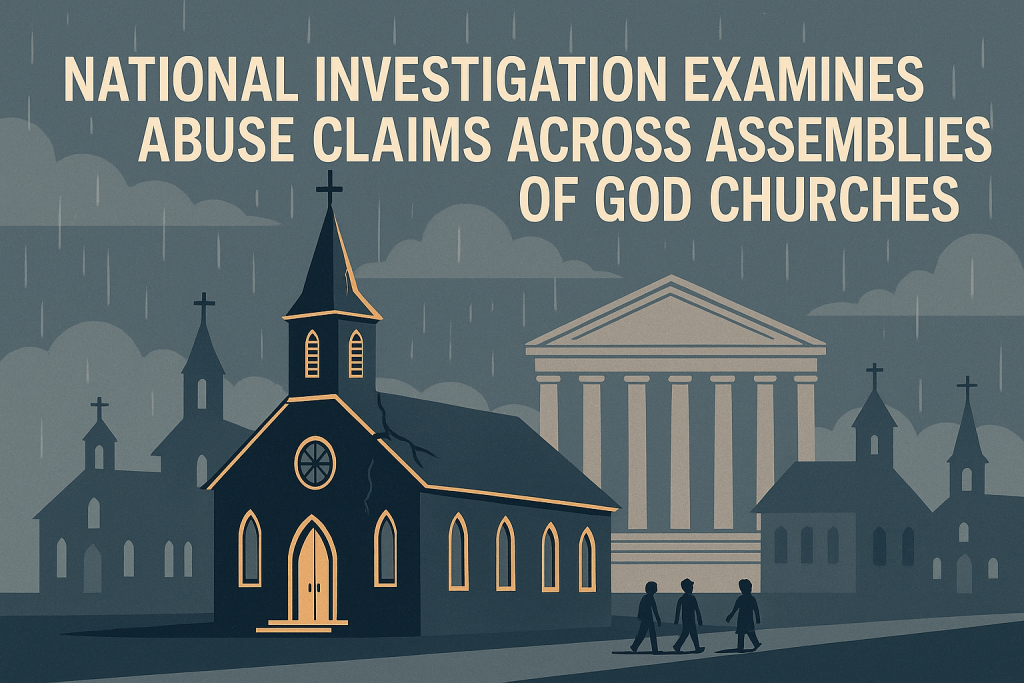A recent investigation by NBC News and affiliated outlets reveals that the Pentecostal denomination known as the Assemblies of God has faced allegations of child sexual abuse and institutional failures spanning nearly five decades.
According to the report, nearly 200 pastors, church employees and volunteers affiliated with the Assemblies of God have been accused of sexual abuse—many involving children—dating back to the 1970s. The investigation further alleges that in some cases the denomination’s structure, which emphasizes local church autonomy, may have contributed to weak oversight and persistent risks of abuse.
While the Assemblies of God’s national leadership responded with a video statement indicating regret and reaffirming their “zero tolerance” policy, critics note that key institutional reforms, such as centralized background screening, mandatory reporting throughout the network, and independent review of abuse claims, have been resisted or delayed.

Why This Matters for Survivors and Civil Claims
When abuse occurs in environments where children are entrusted to institutions (such as churches, schools, youth camps or ministry programs), civil-injury law may extend beyond individual wrongdoing. Potentially relevant claims may include negligent hiring, negligent supervision, failure to implement safe-policies, and failure to report known risks. The alleged facts in this investigation suggest a pattern of institutional risk, recurring misconduct over decades, and possible omissions in oversight.
Importantly, in California and other jurisdictions, statutes protecting childhood sexual-abuse survivors often permit extended filing timelines and special evidentiary rules—making earlier recognition of potential civil rights important for families and individuals.
Looking Ahead
As the news coverage of the Assemblies of God situation continues, families, former members, and institutions alike may monitor how the denomination responds—whether independent investigations are commissioned, safe-policy reforms are adopted, and new transparency measures implemented. Meanwhile, for survivors, documenting institutional interactions, preserving records of volunteer roles/credentials, and noting history of complaints or internal investigations may prove critical for any potential civil evaluation.
Easton & Easton’s Ongoing Advocacy for Survivors
At Easton & Easton, our firm is committed to standing with survivors of childhood sexual abuse, particularly in cases involving religious institutions and other organizations entrusted with the care of minors. We recognize that many survivors carry deep emotional burdens, including concerns about faith, family, and whether their experiences will be acknowledged. Those realities shape the compassionate, trauma-informed approach we bring to every case.
Our work goes beyond the courtroom. We regularly help clients connect with therapeutic professionals, survivor-support services, and community resources that can assist in the healing process. For many individuals, civil accountability is only one piece of a much larger journey toward recovery and stability.
The allegations highlighted in this investigation serve as an important reminder of the need for strong oversight and institutional responsibility within our communities. Attorney Saul Wolf continues to apply his significant experience litigating complex abuse cases to uncover systemic failures and pursue justice for those who have been harmed. His background includes civil actions involving Church Entities, including the Roman Catholic Church, Private Schools, Public School Districts, including LAUSD, Youth-Serving Organizations, such as Boys & Girls Clubs and YMCAs, Youth Sports Organizations and National Governing Bodies, including USA Water Polo and USA Cheer.
Easton & Easton remains dedicated to helping survivors seek answers, accountability, and a measure of justice, while continuing to advocate for safer institutions throughout Orange County, Riverside, and beyond.

